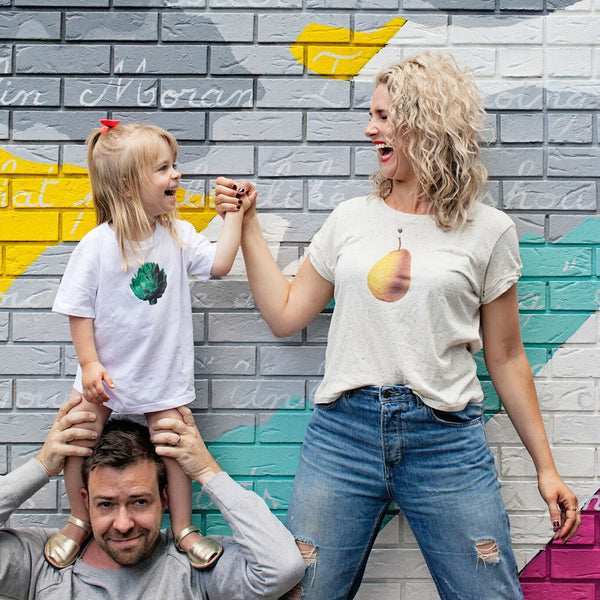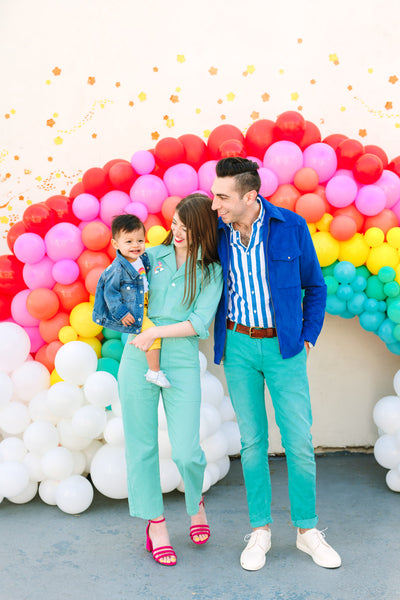No Products in the Cart
Left: UK based dad Matt Farquharson aka Papa Pukka
Right: US based dad Jeff Mindell from Studio DIY
We love connecting with families from all around the world on our Instagram feed and the photo-sharing app has made it possible for us to glimpse a snapshot of what it’s like to be a parent in every corner of the globe.
One of the families we enjoy following across the pond in America is the Mindells. Kelly and Jeff live in LA with their son Arlo, who has just turned one. Jeff works as a photographer and Kelly runs a successful blog called Studio DIY. The couple juggle parenthood around their work commitments.
A family doing a very similar thing in the UK is Anna Whitehouse and her husband Matt Farquharson (aka Mother Pukka and Papa Pukka). The pair are raising their daughters Mae and Evie around their freelance careers as writers and have just penned their first book together, the Sunday Times Bestseller ‘Parenting the sh*t out of life’, out now on Amazon.
The cultural differences in the UK VS the US are well documented, but we were curious to find out how different it is to be a parent on either side of the Atlantic. With Father’s Day just around the corner on June 17th, we asked Matt and Jeff to interview each other about everything from the difference in their parenting styles to how much paternity leave they get. Read their conversations about fatherhood below…

Matt with his wife Anna (aka Mother Pukka) and their eldest daughter Mae (photo credit @emilygrayphoto)
JEFF ASKS MATT ABOUT FATHERHOOD IN THE UK
Jeff: We live in LA, and California is the first state to mandate paid paternity leave. What’s it like in the UK? Do new dads usually take time off or is there a stigma attached?
Matt: California, I salute you! In the UK, dads in full-time work get two weeks paid and that's all most take. I was freelance with both of ours and took about a fortnight, and, if I'm honest, I was ready to go back to work afterwards. Newborns are a bit like an elderly and infirm cat: they sleep for 18 hours in 24, you move them from room to room over the course of a day and they wail when they need things. Anna was breastfeeding, so other than fetching snacks for her, changing nappies and cuddling the nipper, there wasn't much to do.
But, a few years ago, men here got the right to something called Shared Parental Leave – guys can now use part of their wife's 12 months of maternity entitlement. The first three months are paid, the next three reduced pay, last six unpaid. It's still only taken up by a tiny proportion of men, but those that do tend to use it at the end of the 12 months, when the baby is usually off the boob. Our second is coming up to one year, and I'm planning to take a bit more time now to look after her.
JM: Kelly and I have made a conscious effort not to gear shift too much since Arlo arrived. We still keep up with our work schedules, taking him along for the ride. How do you juggle fatherhood and work and what are the flexible working opportunities like for parents in the UK?
MF: That's the right way to do it, I think, though we've found it a bit trickier with two. The nature of Anna's work means it's not unreasonable to take one of the girls to a meeting and have her colouring (in the case of the eldest) or gurgling (for number two) in the corner of the room. She's even given a few talks with our second strapped to her front. In the UK, after six months in a job you have a legal right to ask for flexible working, but employers can reject this for any 'business reason' they like, so only 1 in 10 requests by men and 4 in 10 by women get accepted. This seems desperately short-sighted to me. Flexible working has been proven to raise productivity, improve employee retention, aid recruiting and can help cut costs on rent. About two years ago we started a campaign called #flexappeal to encourage more people to ask for it and more employers to trial it. It's seen Anna give evidence to parliament, seen us do lycra-clad flashmobs in Trafalgar Square, and hundreds of people (mostly mums) tell us they've requested flex at work. Our plan is to keep fog-horning on about it until the message gets through.
JM: How do you and Anna balance parenting and would you say moms and dads have equal parenting roles in the UK generally?
MF: We're pretty even. We both work full time, so there's no excuse not to be. And I think that's becoming more of the norm for this generation of parents. The economics of the age mean it's less feasible for just one parent to work.
JM: I’ve loved becoming a dad because I’m seriously a huge kid. What’s your fatherhood style and do you think it’s different to your own father’s?
MF: Very occasionally, if I arrive at a meeting with a curdled milk stain on my clothes after a night of three hours sleep, or if both kids are screaming about nothing in particular, I do wonder if my dad's generation had it easier – go to work, have a couple of beers, come home for dinner once the kids are asleep. But then your kids become like lodgers to you and you miss out on too much, so the appeal passes very quickly. I tend to play fatherhood for laughs, like some kind of surrealist improv stand-up, hoping to keep the girls entertained for long enough that they don't get bored or stroppy. But I am very proud of the sternness I've managed to develop in my 'serious voice' if they misbehave. I basically sound like a village policeman telling someone off for a minor parking violation.
JM: And finally, how’s it been for you becoming a dad? What have been the coolest bits and any really tough times?
It's great, mostly. I've created tiny female versions of myself and get to see them become people. The troughs are spiritually and physically exhausting, but the peaks are more uplifting than anything else I've experienced. For every squawking hissy fit about the wrong-coloured spoon, there's a spontaneous shin cuddle around the corner. The first time my daughter said 'I love you' unprompted, it felt like my lungs had been given a sudden infusion of oxygen and I realised that I would be her loving servant until the day I enter a care home (when hopefully I'll get some return on the previous decades of service). As long as there's a bit more laughing than crying, I think you're doing alright.

Jeff with his wife Kelly (Studio DIY) and their son Arlo
MATT ASKS JEFF ABOUT FATHERHOOD IN THE US
Matt: In Britain it is traditional for fathers to hide from their families in a shed – a rickety wooden structure in the garden full of unused tools and a secret supply of liquor. Are American dads as eager to escape their brood, or is this a uniquely British failing?
Jeff: Haha!! I think the need to have alone-time is total human nature. I for one, LOVE being alone in general. My someday dream would be to go on a solo vacation and do whatever I want, when I want, wake up when I want instead of to an alarm, etc. When I'm home and in "Dad mode" and able to steal a few minutes here and there, I'll do it for sure! I live for my morning coffee and it's my one daily ritual that I do just for me. I realized a while back that it's important to do something that makes me happy, no matter how small or trivial, so going out to grab my morning cup –that's my thing. That being said, even if I'm at work for just a few hours a day, I miss my kid so incredibly much it hurts. So I really go back and forth haha!
MF: Do employers see the benefits of flexible working in the US? In the UK you have a legal entitlement to ask for it, but most requests (60% of those made by women, 90% of those made by men) still get turned down
JM: That is fascinating to me!! I work for myself so I can only really answer this question based on my knowledge from the few years I spent in the corporate world, but yes for the most part, I'd say employers are definitely seeing the benefits of flexible working schedules. As our American workforce is growing and the newer generations are coming up in the ranks, I am seeing more and more companies adopting the mentality of "if the work is getting done well and on time, we don't really care when/where/how". I personally love this school of thought as you then have dedicated workers who come to the table with a really healthy work/life balance, elevating both their work ethic and quality personal or family time.
MF: How does the parenting balance divvy up between you and Kelly? If there was a diaper-changing and food-mushing league table over your time together, who would win?
JM: Oh man, love this!! I would say that I definitely win the diaper-changing trophy and Kelly really excels with our son's food and mealtimes. In the beginning, when Arlo was just home from the hospital, I remember feeling very confident with the whole diaper thing SOLELY because I knew that it was something that I could help him with. I didn't know if a cry was because of hunger, sleepiness, him being hot or cold, etc. but I knew that changing his diaper was a good thing and would only improve the situation. And I just kept with it and now it's just the thing I do for him! On the other hand, I just get too frustrated with all the food thrown, to be in the kitchen during mealtimes so I just remove myself from the situation and hide accordingly.
MF: And finally, most Brits are surprised to learn that US workers only get 10 days holiday a year (plus public holidays): how do you think it affects family life?
JM: Honestly, because it's the norm here, we don't really know any different! And the same goes for the families of those workers. For the most part, people who don't work for themselves have a general understanding of what they are in for when they accept a position within a company. They generally know their hours, their job responsibilities and what is expected of them. As much as I hate to admit it, people always say that Americans live to work instead of working to live – and it's true. Now that we are able to make our own schedules, Kelly and I really make a conscious effort to take deliberate family time, days during the week where we aren't checking emails and taking calls, but spending time together with our son. Lately, it's been Fridays (which we've dubbed Family Friday) and we'll take him to the park or Disneyland for the day. It's been wonderful and something to look forward to that helps keep us sane during the more stressful times during the week.